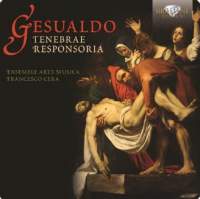Texte paru dans: / Appeared in:
*

International Record Review - (10//2014)
Pour
s'abonner / Subscription information
Brilliant 94804

Code-barres / Barcode
: 5028421948041
Consultez toutes les évaluations recensées pour ce cd
~~~~ Reach all the evaluations located for this CD
The idea of relieving the heady textures of the Gesualdo Tenebrae responsories with chant appropriate to the season is not new ‑ the Taverner Consort (of course!) explored the idea for Sony Classics in a CD, since reissued on Avie, placing the Good Friday set in a possible liturgical context. Francesco Cera, however, does not pretend here that the context his interventions supply is anything other than purely dramatic. Gesualdo's motets are selected and reordered according to the demands of the Passion narrative. 11 have been chosen from across the full set of 27 and are not presented in the original printed order, although logically enough also too far from it: the first four motets in the selection are all from the first (Maundy Thursday) set and the selection concludes with Sepulto Domino ‑ as it could hardly fail to do. The result is certainly effective even if not necessarily scholarly. Even less scholarly is Cera's decision to ignore some of the given repeats. The third, sixth and ninth motet from each set strictly speaking require an extra da capo ‑ even if not every listener (or singer) would pretend that these extra repeats always seem necessary or even welcome.
Cera's ensemble is quite magnificent, with a rich, direct approach from the solo voices. Their full, reedy tutti blend has just the right amount of grain. The motets are sung a semitone below 'modern' pitch ‑ moving the general sonority towards the bass without,
going
quite as far as the Hilliard Ensemble, a semitone lower again (with
countertenors on the upper voices). The only female voices are on the upper
two parts and they sound more than comfortable with the rather low range
required; the altus line is taken by a tenor and the lower lines
(particularly of course the very lowest) are firm and secure right into the
depths. Purely at the vocal level this is some of the finest singing on
record in this repertoire, at least for those who prefer their Gesualdo
intimate and brooding. Tempos are relatively leisurely and fairly
consistent. The chant passages are sonorously sung, largely without overt
dramatization and the whole is commendably consistent ‑ hardly to be taken
for granted with such a project. It is of course possible to quibble with
any selection made from among these motets, especially one not
made according to unarguable principles such as liturgical propriety or the
three‑night division, above all when it alters the published order. Under
such circumstances it is hard not to lament the absence of particular
favourites from the selection, especially when the reason for their absence
seems as much as anything else to be their failure to fit the
narrative demands of the project and its one‑CD duration ‑ it is a
great pity indeed that there was no room for Tristis est anima mea
and Aestimatus sum. But I am supposed to be reviewing what is here,
not what isn't ‑ and what there is quite splendid.
Fermer la fenêtre/Close window
Cliquez l'un ou l'autre
bouton pour découvrir bien d'autres critiques de CD
Click either button for many other reviews


